Anti-Semitic Graffiti in Cobb Schools Alarms Community
Local leaders are mostly dissatisfied with the reaction of the county’s school board.
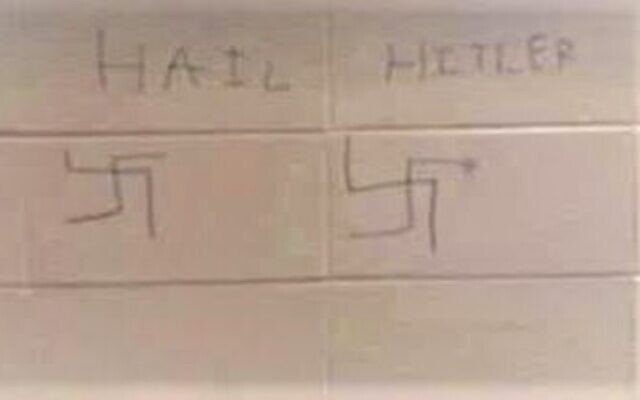
Swastikas and “heil Hitler” graffiti — spelled correctly or not — admittedly garner headlines. But while Atlanta Jewish leaders agree about the complexity of the issues involved, they disagree about the seriousness of such incidents, including the most recent ones in Cobb County middle and high schools.
In the middle of the High Holy Days, Pope High School reported two incidents of anti-Semitic graffiti, while Lassiter High School and Simpson Middle School each reported one. According to rabbis of congregations whose members attend those schools, the wrongdoers have been identified. “The two kids have been identified in the original drawing and they will go through the court system,” said Rabbi Larry Sernovitz, senior rabbi at Temple Kol Emeth. “I think it should be treated as a hate crime,” he said, referring to the graffiti at Pope.
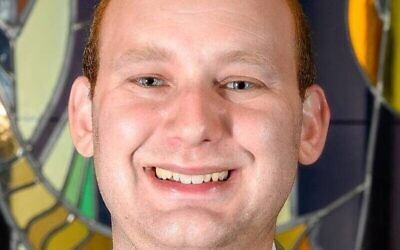
“Maybe it is a crime,” said Rabbi Daniel Dorsch, of Congregation Etz Chaim, “but it’s our obligation to educate. I see misguided kids who need our help. They need our love as well as G-d’s love.”
Dorsch added that he sees a “real danger” in lumping all the incidents together “as one and the same.” He believes that the latter incidents — at Lassiter and Simpson — may be copycats due to the publicity surrounding the initial graffiti. “This motivation may be different from the original motivation,” he said.
Unquestionably, the graffiti attracted widespread attention. Georgia Sen. Jon Ossoff spoke at Temple Emanu-El’s Yom Kippur services, saying, “My generation was raised with the words ‘never forget’ pressed into our minds. And so when at Pope High School in Marietta, Ga., a swastika and a tribute to Adolf Hitler are scrawled on school walls, during Yamim Noraim — our Days of Awe — no less, it must inflame in us the same passion for the survival of our people that burned in the hearts of the generation that emerged from the Shoah, and built a future for the Jewish people here in America, around the world, and in the land of Israel.”
One of the more unusual guests at a Yom Kippur service this year was Cobb Board of Education Chairman Randy Scamihorn, who attended Temple Kol Emeth at Rabbi Sernovitz’s invitation. After rescheduling a regular Thursday board meeting, Scamihorn spent the morning at the synagogue. “He said he learned a lot about the Jewish community and why Yom Kippur is so important,” said Sernovitz.
Scamihorn’s Yom Kippur visit was particularly significant because the Cobb County School District has come under fierce fire for not addressing the anti-Semitic aspect of the graffiti, which included swastikas and “Hail Hitler” written above urinals in the school’s bathrooms. Pope Principal Thomas Flugum didn’t mention the anti-Semitic significance of the graffiti in his school, while the Cobb County school district called it merely “hate speech.”
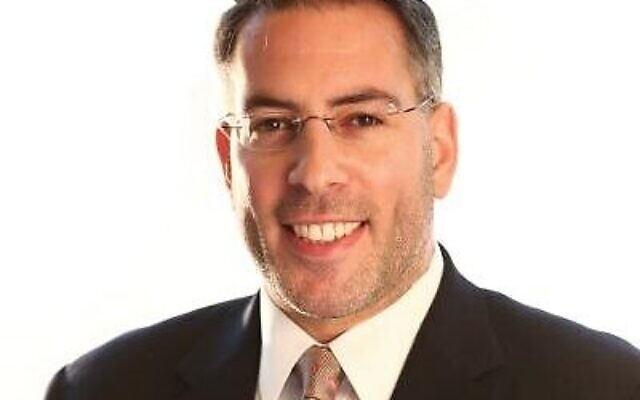
However, in a letter to parents, Lassiter Principal Dr. Chris Richie noted that there were “two bathrooms where anti-Semitic symbols (swastikas) and anti-Semitic language (Heil Hitler) were displayed. In both locations, the deplorable symbols and language were behind stall doors.”
Simpson Middle School Principal Dr. Mari LaEla Mitchell also received “high marks” for her reaction, said Rabbi Dorsch. “She wrote a beautiful email and she called it out as anti-Semitism,” he said. Despite the fact that no similar graffiti was found at Walton High School, Dorsch said its principal also stated that the school will not tolerate anti-Semitism.
Separately, Pastor Sarah K. Fisher, the rector of St. Catherine’s Episcopal Church in Marietta, “issued a statement” that was “incredibly powerful” and supportive, said Sernovitz.
“The positive school responses help kids feel better when it is called out” as anti-Semitism, said Dorsch. But many in the Jewish community are clearly unhappy with the Cobb County School Board’s reaction. In its response, the board urged “families to talk to their students about the impacts of inappropriate and dangerous trends circulating on social media,” referring to the incidents resulting from a call on the TikTok social media app for students to vandalize school property and then brag about it.
Grassroots organization Atlanta Initiative Against AntiSemitism (AIAAS) immediately asked the community to sign a petition against the school board’s “inadequate response to the recent acts of anti-Semitism.” In less than a week, more than 3,000 people had signed the petition.
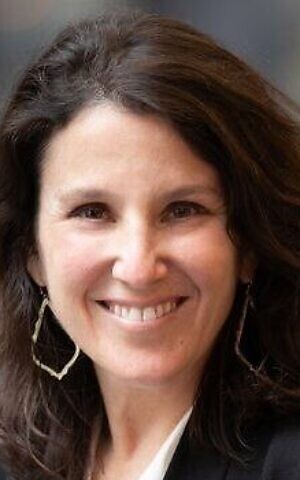
AIAAS co-founder Lauren Menis told the AJT that the group’s goal for the petition was two-fold. “First, we are asking the Cobb County School Board to acknowledge the incidents at the two schools for what they were — anti-Semitic acts. We do not believe these acts of hate should be folded into the social media trends discussion that have caused other issues at schools. We want them to name the hate, to call these acts what they are — anti-Semitic. Naming the hate is important. It holds people accountable. It makes those affected feel heard, and it allows you to address it head-on. If you don’t name it, you can’t fix it.”
Menis also said, “We are asking the school board to allow anti-hate training back into their schools. Incidents like these two are teachable moments if handled correctly. By not naming it and not allowing anti-hate educational programming to address this in their schools, the schools have denied a valuable opportunity to help students and staff learn from these events and help prevent others in the future.”
Menis was referring to the fact that Cobb County schools have stopped working with the Anti-Defamation League (ADL) on its No Place for Hate initiative, a free “school climate improvement framework” that “helps create a welcoming school community committed to stopping all forms of hate, bias and bullying.”
ADL Southern Division Vice President Allison Padilla-Goodman said that Cobb County schools had long been an ADL partner until June, when the board passed a resolution banning the teaching of Critical Race Theory and The New York Times’ 1619 project in district schools. The resolution didn’t specify what CRT was, but the board dropped the No Place for Hate initiative.
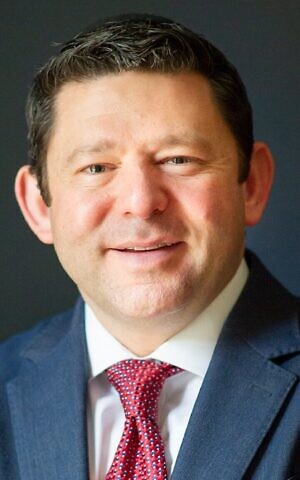
As Padilla-Goodman explained, CRT has never been taught in kindergarten-through-12th grade classes in Georgia schools. “It’s an upper-level elective course in law school programs,” she said. “None of our programs talked about critical race theory,” she emphasized. But “suddenly 20 schools stopped” offering the No Place for Hate program without explaining why.
All other school districts in the metro area continue to participate in the ADL’s initiative. Padilla-Goodman has said that “people are asking whether they want to live in Cobb County” as a result.
In a statement, she wrote that the Cobb County resolution is a “direct example of how these shortsighted, politically-driven policies will have a detrimental impact on our children. … As hate crimes surge in Georgia and across the country, it is unacceptable that Cobb County schools are failing to address or even name anti-Semitic incidents occurring in their own schools, and refusing to engage with the ADL to respond effectively. … The passage of their resolution banning Critical Race Theory could tie their hands in responding to and countering incidents of hate through educational initiatives for the school community.”
As of press time, a school district spokesperson had not replied to the AJT’s question as to why Cobb County’s schools are no longer partnering with the ADL. Padilla-Goodman said she thought the community might learn more at the board meeting scheduled for Sept. 23. Referring to the recent anti-Semitic graffiti, she added, “How they handle it will be telling. It’s a real opportunity for Cobb County to respond strongly and show that they care about the students.”
The reactions of Cobb County students to the graffiti have been mixed. At least one student was afraid to attend school the next day, one rabbi reports. Other students were eager to speak out at the weekly school board meeting.
But Rabbi Chaim Neiditch, executive director of the Jewish Student Union, who has been working with Jewish students in approximately 20 schools for 16 years, said anti-Semitic graffiti is not the teenagers’ biggest issue. He noted that in May, during the latest Israel-Gaza flare-up, Jewish students were verbally attacked for Israel’s policies, “as if a 15-year-old is responsible for what another country does.” Secondly, “Jewish kids are afraid to take off from school for the Jewish holidays. They say teachers don’t understand what Yom Kippur is,” he said. He suggests that kids are participating less in religious services as a result.
But he doesn’t think there’s systemic anti-Semitism in any of the high schools he works in. “I’m not more afraid in Cobb County schools than in Fulton County schools,” said Rabbi Neiditch. “I don’t see anti-Semitism in these schools.”
Several Cobb County rabbis also see a silver lining in the recent incidents of anti-Semitic graffiti. “There’s a lot of hope in this, too,” said Rabbi Dorsch. He pointed out that he was wearing his kippa and a Star of David mask when shopping in an East Cobb Trader Joe’s days after the incidents. A bag boy named Will said to him: “I’m so sorry you had a tough week. I’m sorry.” Dorsch recalls being “so touched” by the exchange.
“That’s empathy,” the rabbi said.
- Jan Jaben-Eilon
- News
- Local
- Senator Jon Ossoff
- Pope High School
- congregation etz chaim
- Rabbi Daniel Dorsch
- Rabbi Chaim Neiditch
- Fulton County Schools
- Cobb County Schools
- Temple Kol Emeth
- Rabbi Larry Sernovitz
- ADL Southern Division
- Allison Padilla-Goodman
- ADL
- No Place for Hate program
- Swastikas
- Cobb County Middle School
- Cobb County High Schools
- High Holy Days
- Lassiter High School
- Simpson Middle School
- Yom Kippur services
- Marietta Ga
- Yamim Noraim
- Days of Awe
- Israel
- Cobb Board of Education
- Randy Scamihorn
- Thomas Flugum
- anti-Semitic
- Dr. Chris Richie
- Dr. Mari LaEla Mitchell
- Walton High School
- Pastor Sarah K. Fisher
- St. Catherine’s Episcopal Church
- jewish community
- TikTok
- Atlanta Initiative Against AntiSemitism (AIAAS)
- Lauren Menis
- Critical Race Theory
- The New York Times
- Jewish Student Union
- kippa
- Star of David mask
- Trader Joe's
- Temple Emanu-El
- anti-Semitic graffiti



comments